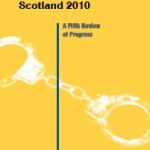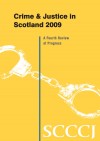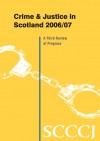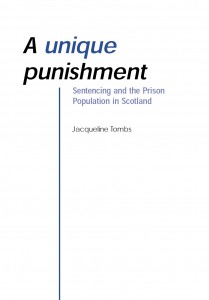If you can’t find what you are looking for here try our FAQs page
These comprise briefing papers; reports, papers and presentations from seminars and some responses to reviews and consultations (If you wish to quote from these articles, please reference the author or SCCCJ, where appropriate, thank you).
By Subject:
Overview of crime and justice in Scotland
Community Sentencing Versus Prison
Criminal Justice
Desistance
Drugs & Substance Misuse
Inequality
Parole & Recall
Police
Prison Population
Prison Privatisation in Scotland
Redesigning Community Justice
Sentencing
Transitions From Prison to Community
Victims
Women Offenders
Youth Justice
Overview of Crime and Justice in Scotland
- Crime & Justice in Scotland - a review of progress (data covering 2004-2005)
- Crime & Justice in Scotland – a second review of progress (data covering 2005-2006)
- Crime & Justice in Scotland – a third review of progress (data covering 2006-2007)
- Crime & Justice in Scotland – a fourth review of progress (data covering 2007-2009)
- Crime & Justice in Scotland – a fifth review of progress (data covering 2008-2010)
Community Sentencing versus prison
- Seminar on the introduction of community payback orders in Scotland (2010)
- “A criminological view on community payback” presentation by Prof Shadd Maruna, Queen’s University Belfast, 2010
- Review of community penalties – note from SCCCJ, (2007)
- Giving up crime: direction for policy. Beth Weaver, Prof Fergus McNeil, (2007)
- Comments from SCCCJ on the Scottish Executive Consultation: Reduce Rehabilitate Reform
- Addiction, Recovery, Prison? Report of meeting, May 2012
- Making sense of drugs & crime. SCCCJ (2002)
- Modelling Addiction: The Bio-Psycho-Social model of addiction. Dr Oliver Aldridge, MBBCh, DRCOG, MRCGP Certificant of the International Society of Addiction Medicine
- Thinking about parole and recall –Nicky Padfield, (2009)
- Seminar report on recall to custody, (2009)
- Prison Population in Scotland seminar report. SCCCJ, (2010)
- Presentation: Revisiting “A unique punishment”. Prof Jackie Tombs, SCCJR, (2010)
- Presentation: Scotland and very short prison sentences. Dr Sarah Armstrong, University of Glasgow (2010)
- A Unique punishment – sentencing and the prison population in Scotland. Prof Jackie Tombs, (2004)
- The Cost of Unnecessary imprisonment. Prof Alec Spencer, (2007)
- Reducing the prison population: penal policy & social choices, (2005)
- Data on prison privatisation from Scottish parliamentary questions (2009)
- The public expenditure implications of the private finance initiative: case study of the NHS in England and Scotland. Prof Allyson Pollock, University of Edinburgh, (2007)
- Policy and operational implications of prison privatisation. Prof Andrew Coyle, International Centre for Prison Studies (2007)
- Privatisation Still Not Proven: A Snapshot of International Developments. Stephen Nathan, (2007).
- Prison Privatisation in Scotland – A Briefing Paper. SCCCJ (2006)
- Report on the event on strengthening the presumption against the use of short sentences 4th December 2015
- Comments by the Scottish Consortium on Crime and Criminal Justice on the Report of the Sentencing Commission for Scotland
- Presentation: Sentencing reform, panels, commissions, reforms, guidelines. Prof Neil Hutton, Strathclyde University, 2009.
- Report: women affected by the criminal justice system 1st April 2015
- Report of Follow-up Event on Women Offe ders Jan 2013
- SCCCJ / SWGWO response to Angiolini Report
- Updated Action plan on women offenders (2012)
- Report on the women’s offending meeting, including an action plan with list of recommendations to support women offenders. SCCCJ (2011)
- Understanding the drivers of female imprisonment in Scotland. Prof Gill McIvor, Prof Michele Burman, SCCJR, Universities Stirling & Glasgow (2011)
- Slides of “the drivers of female imprisonment”. Prof Gill McIvor & Prof Michele Burman, SCCJR, Universities Stirling & Glasgow, (2011)
- The effects of imprisonment on families. Dr Nancy Loucks, Families Outside (2011)
- From prisoner to patient – changing the perspective on vulnerable women in the criminal justice system. Allister Short, NHS Lothian, (2011).
- Speech by Baroness Vivien Stern about women in prison in Scotland, at the Scottish women in Parliament dinner (2011)
- Women in prison in Scotland: an unmet commitment. SCCCJ, (2006)
- Action plan developed from event on women in prison. SCCCJ (2006)
- What would help young people with mental health issues stay away from the criminal justice system? event report 13th February 2015
- Presentation “Issues faced by young people in secure care” from the Interventions on Vulnerable Youth Project
- Report on youth justice seminar – a holistic approach. SCCCJ (2011)
- Aberdeen Youth Justice Development programme – the whole system approach. Stuart Robb, Scottish Government, ACC Colin Menzies, Billy Nicol, Sacro (2011)
- Grampian youth justice development programme – background for youth justice event. Inspector Lyn Ross, Grampian Police, (2011)
Prison Privatisation in Scotland
For further information on prison privatisation see “What good are markets in punishment?” paper by Dr Sarah Armstrong, Prison Service Journal, Issue 172.
Report from Seminar 15th April 2013: Redesigning Community Justice
Transitions From Prison to Community
Chronological Order of publications
December 2011
 Crime & Justice in Scotland 2010 - A Fifth Review of Progress
Crime & Justice in Scotland 2010 - A Fifth Review of Progress
This report aims to provide an independent overview and assessment of the data on crime in Scotland and the response of the criminal justice agencies.
The report has a foreword by Dr Tapio Lappi-Seppälä, Director of the National Research Institute of Legal Policy, Finland. Finland is a country with the same size of population of Scotland and some of the same health and social problems. However, its rate of imprisonment is less than 40% of the Scottish rate and its prison population is declining.
In his foreword Dr Lappi-Seppälä comments that Finnish imprisonment rates have declined in the past 10 years whilst those in Scotland have risen and comments:
“The report gives a simple explanation for the increased number of prisoners in Scotland. At the same time as the proportion of offenders receiving custodial sentences is increasing, the length of sentences has become longer. This double change lifted the Scottish incarceration rate from the level of 100 (per 100,000 population) in the early 1990s to the level of around 160. The obvious way to reverse this trend is to reduce either the number of prison sentences, or the length of prison terms (or both).”
He adds: “There is no reason to assume that increased use of imprisonment explains declining crime in Scotland.”
Despite commitments by successive governments to reduce the number of people in prison, the numbers continue to rise year on year More dramatically, over the last 10 years, the number of women in prison has doubled compared with a 31% rise for men over the same 10 year period. SCCCJ welcomes the current Commission on Women Offenders chaired by Dame Elish Angiolini and look forward to its report in February 2012. There have been some real improvements in the system but the rate of incarceration remains a continuing issue.
November 2011
Transition from Prison to Community Round-table Discussion
Chair: Professor Andrew Coyle of the International Centre for Prison Studies.
Transitions from Prison to Community Report (.doc)
The discussion focussed on the following questions:
(a) What are the key components in preparing a prisoner for return to the community?
(b) What is the future of the open prison? Can open prison be improved or changed?
(c) Should there be more experience of the community during a prison sentence, taking account of the need to protect the public? Can mainstream prisons contribute better to preparing a prisoner for return to the community? Could HDC be used more positively in this connection?
(d) What are the key components of preventing reoffending while on licence?
October 2011
Women’s Offending Round-table Discussion
Baroness Stern said that with the appointment of the Commission on Women Offenders and also through the work of the Scottish Working Group on Women Offenders there was a real window of opportunity to achieve something in this field of women’s offending. It was not a new problem. For over ten years a range of studies and reports had drawn attention to the problem and suggested solutions. Yet, over this same period the average daily population of women prisoners, far from declining, had doubled and now stood at 477.
Report on women’s offending meeting (.pdf)
The above is a report of the round-table event held on 7th October 2011 to discuss issues of women’s offending in Scotland. The chair of the event was Baroness Vivien Stern, Honorary President of SCCCJ, and the event was attended by The Rt Hon Dame Eilish Angiolini, DBE, QC, and head of the Commission on Women Offenders, as well as her fellow commissioners. Other delegates were from the criminal justice system in Scotland and are listed in Annex A of the report. This event was funded by the Esmée Fairbairn Foundation (grant number 09-2219) and Sacro and was held in conjunction with the Scottish Working Group on Women’s Offending. Presentations were given on “The drivers of female Imprisonment” by Prof Michele Burman, University of Glasgow and Prof Gill McIvor, University of Stirling, who also submitted a copy of their paper on the same subject published by SCCJR. Dr Nancy Loucks, Chief Executive of Families Outside, gave a paper on the effect of female imprisonment on families. Sheriff W Seith S Ireland spoke about sentencing female offenders and Allister Short, Strategic Programme Manager (Community Planning), NHS Lothian gave a presentation on “From prisoner to patient - changing the perspective on vulnerable women in the criminal justice system“. His presentation included information on the Willow Project, a partnership between NHS Lothian, the City of Edinburgh Council and Sacro. Its aim is “addressing offending - improving health and wellbeing.
July 2011
Youth Justice Seminar report (.pdf)
Report of the SCCCJ / Sacro seminar on held in May 2011 to discuss the ‘whole system’ approach to youth justice. This event was funded by the Esmée Fairbairn Foundation (grant number 09-2219) and Sacro
“There has long been concern over the sharp boundary between the juvenile justice system in Scotland (The Children’s Hearings) and the adult justice system. Unlike most other countries, this boundary is at the age of 16. Commenting on this, the Scottish Prisons Commission pointed out in their report Scotland’s Choice (July 2008) that Scotland imprisons an unusually high number of under 18’s in comparison with European neighbours. The most recent prison statistics are set out in this background.
In view of the importance of this issue, the Scottish Consortium on Crime and Criminal Justice held a seminar at Sacro National Office, 29 Albany Street, Edinburgh on Tuesday 31 May 2011 to discuss the scope for recent developments in the ‘Whole System Approach to Youth Justice’ to improve the situation through the availability and use of services to prevent the unnecessary use of custody and secure accommodation. The purpose of the seminar was to explore ways of reducing the use of custody while still tackling the causes of offending in an effective way. The seminar drew in particular on the experience of work in Aberdeen which is described more fully in the background note below.”
February 2010
 Crime and Justice in Scotland 2009. Fourth review of progress (.pdf)
Crime and Justice in Scotland 2009. Fourth review of progress (.pdf)
Commentary on criminal justice in Scotland covering 2008 – 2009.
Community Payback Order Seminar (.pdf)
Report from the SCCCJ and SCCJR seminar held on 23rd February 2010, on the community payback order. The purpose of the seminar was to clarify the intention behind the proposed new Scottish Community Payback Order; how its success would be judged; and how it could be made both effective and acceptable, to sentencers, to the press and to the public. See also the presentation by Prof Shadd Maruna on “A Criminological View on Community Payback”. The event was organised with funding from the Esmée Fairbairn Foundation [grant number 09-2219] and also from Sacro. The report was authored by SCCCJ with contributions from speakers, and the PDF of the report is kindly produced by SCCJR (Scottish Centre for Crime and Criminal Justice Research.
April 2009
Note from Seminar on Parole and Recall held on 24th April 2009 at the University of Glasgow
Joint SCCCJ and SCCJR (Scottish Centre for Crime and Criminal Justice Research seminar to discuss recent developments in the recall of prisoners to custody in Scotland. See also Seminar Note from Nicky Padfield, senior lecturer, law Faculty, the University of Cambridge
February 2009
Prison Privatisation in Scotland: Freedom Of Information Request Documents to the Scottish Prison Service
On 10th July 2008 SCCCJ wrote to the Scottish Prison Service [SPS] requesting information about the costs of cancelling the HMP Addiewell and HMP Kilmarnock private prison contracts.
Prison Privatisation Dossier on prison costs based on information from Scottish Parliamentary Questions (October 1999 to December 2008). The collation does not include all relevant questions as many repeat earlier ones, but it includes all the information given in parliamentary answers that our searches revealed. The information is presented under subject headings and in date order starting with the earliest.
August 2008
 Crime and Justice in Scotland 2006-7. Third review of progress (.pdf).
Crime and Justice in Scotland 2006-7. Third review of progress (.pdf).
Scotland’s crime rates are stable- despite this our imprisonment rate is fourth highest in Western Europe and rising. The report shows that crime rates in Scotland over ten years have been relatively stable and for some types of crime the rates are falling. However, as the report also shows, Scotland still makes more use of imprisonment than all comparable countries in Western Europe. Scotland’s rate is the fourth highest in Western Europe, more than double the rates of Denmark and Finland and nearly twice the rates of Italy, Switzerland, Norway, and Ireland.
July 2007
The Cost of Unnecessary Imprisonment
This briefing paper, by Prof Alec Spencer, looks at a major problem facing Scotland in terms of the number of people being sent to prison.
June 2007
Giving up crime: a direction for policy
A report by Beth Weaver and Fergus McNeil from the Glasgow School of Social Work/Scottish Centre for Crime and Justice Research, Universities of Glasgow and Strathclyde. This sets out eight key principles for policy change to assist people in giving up crime.
2007
Crime and Justice in Scotland 2005-6. The second review of progress (.pdf).
December 2006
Prison Privatisation in Scotland
A briefing paper on issues of prison privatisation in Scotland.
July 2006
Women in Prison in Scotland: an unmet commitment
A Briefing Paper.
“The number of women in prison in Scotland continues to rise although this is not an aim of Government policy. On the contrary the
Government has all-party support for measures to reduce the inappropriate use of prison for women. Much discussion and analysis of the problem led to the establishment of a well-resourced model centre model in Glasgow (the city from which many women prisoners come). The 218 Centre is successful and highly regarded by all connected with it. The Centre opened in December 2003 and in its
first year of operation dealt with 143 women. It provides an alternative path, the path of treatment and rehabilitation for women with many problems. Its contribution to reducing women’s custody in Scotland however will be small unless it is part of a strategic effort in which all parts of the criminal justice system are involved. Eight years after the first report it is time that a coherent plan to reduce the level of inappropriate women’s imprisonment in Scotland is developed.”
May 2006
Early Release from prison
Comments by SCCCJ on the Early Release Report of the Sentencing Commission for Scotland.
October 2005
Crime and Justice in Scotland 2004-5: a review of progress.
This is the first in a series of annual reviews of the progress of crime and justice in Scotland. SCCCJ hopes it will promote discussion and debate and lead to more interest generally in defining, measuring and building on success.
2005
Reducing the Prison Population: penal policy and social choices
The Consortium’s aim in this report is to further the debate about how best to reduce the prison population in Scotland whilst maintaining public safety.
2004
 A Unique Punishment: sentencing and the prison population in Scotland.
A Unique Punishment: sentencing and the prison population in Scotland.
A study of decision making by sentencers in Scotland by Prof Jacqueline Tombs.
Discussion paper on Reduce Re:habilitate Re:form Consultation
This SCCCJ discussion paper has been produced to encourage debate on the current consultation by the Scottish Executive.
2002
Making sense of drugs and crime.
This report goes beyond an analysis of the ‘drug problem’ to indicate how a harm reduction and more principled and effective penal policy on drugs, alcohol and crime could be developed.
November 2000
Rethinking Criminal Justce in Scotland
This report argues for a broad integrated social policy approach to crime reduction, with an emphasis on early prevention, given the evidence that this is the best way to protect victims and communities.